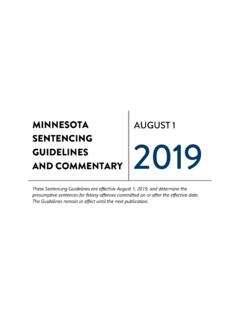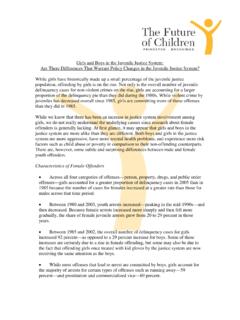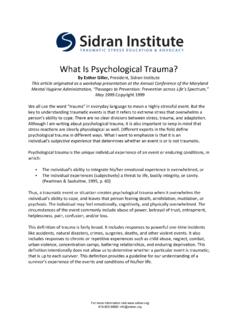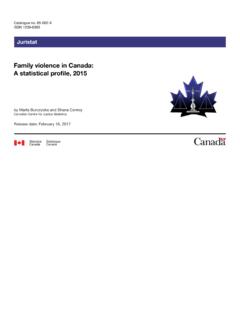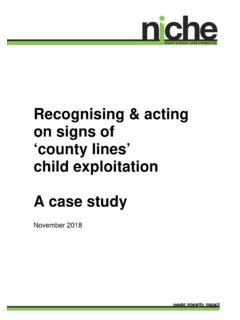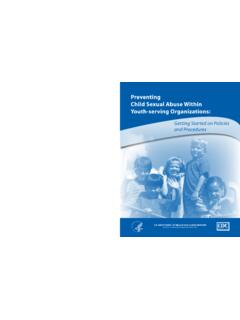Transcription of Sexual violence & individuals who identify as lgbtq
1 EJMI:1 Kfcc ]i\\ /..$.*0$*/0,# nnn%ejmiZ%fi^ G:8I1 Kfcc ]i\\ /''$-0)$.++,# nnn%gZXi%fi^ Sexual violence & individuals who identify as lgbtqResearch BriefThe publications below examine Sexual violence in the form of hate or bias-motivated crimes, intimate partner violence , childhood Sexual abuse, and adult Sexual assault against victims who identify as lesbian, gay, bisexual, transgender, and queer or questioning ( lgbtq ). Sexual assault is extremely damaging to the health and well-being of victims who identify as lgbtq . The studies examined in this brief found correlations between Sexual assault victimization and high-risk Sexual behaviors, mood disorders ( , depression), and suicide attempts among individuals who identify as lgbtq . In the absence of accessible lgbtq - affirming services, victims may encounter barriers to post- assault services due to homophobia and transphobia.
2 Additionally, intersections between systems of inequality and discrimination such as homophobia, transphobia, misogyny, ableism, and racism may heighten risks and challenges for diverse subsets of the lgbtq research brief can assist Sexual assault advocates, lgbtq community advocates, mental health professionals, and medical personnel in understanding the issues confronting survivors who identify as lgbtq . Accessible and affirming post- assault services are crucial for all survivors regardless of Sexual orientation or gender identity, requiring service providers to be knowledgeable about lgbtq , S., & Fountain, K. (2009). Culturally competent service provision to lesbian, gay, bisexual and transgender survivors of Sexual violence . Retrieved from VAWnet, National Online Resource Center on violence Against Women: : This article highlights disproportionate rates of Sexual assault against individuals who identify as lgbtq and stresses the importance of lgbtq -affirming, culturally competent services for Sexual assault : Gentlewarrior and Fountain explore multiple research papers on Sexual assault against lgbtq people published in the 1990s and 2000s.
3 Key results: Due to societal oppression of individuals and communities who identify as lgbtq , some may be 2 Sexual violence & individuals who identify as lgbtq reluctant to disclose their Sexual orientation or gender identity to service providers and researchers, making accurate statistics on the lgbtq community challenging to obtain. Sexual violence against individuals who identify as lgbtq has been perceived as a violent attempt to oppress those who are challenging social norms around gender and sexuality. Many studies that have focused on individuals who identify as lgbtq have found this population has been subjected to Sexual harassment, with high rates reported in academic settings. For example, Fineran s (2002) research suggests a correlation between Sexual harassment victimization and increased rates of suicide attempts and missed school time among gay, lesbian, and bisexual students.
4 Although research is limited, several studies found that respondents who identify as lgbtq reported higher rates of childhood Sexual abuse than heterosexual respondents. Childhood Sexual victimization among gay, lesbian, and bisexual survivors has been correlated with psychopathologies ( , psychological distress, mood disorders), substance abuse, and high-risk Sexual behaviors. However, research indicates that childhood Sexual abuse does not influence Sexual orientation. Several studies indicate that Sexual violence can be a dimension of hate or bias-motivated crimes against adults who identify or are perceived to be lgbtq . For instance, Dunbar Sexual harassment between same-sex peers: Intersection of mental health, homophobia, and j\olXc m`fc\eZ\ `e jZ_ffcj )''- ]fle[ k_Xk gays and lesbians are more likely to experience Sexual assault , Sexual harassment, physical assault and stalking compared to other groups typically targeted for hate crime victimization.
5 This article, as well as Victim experiences in hate crimes based on Sexual orientation (2002) indicate that such hate crimes are less likely to be reported to the authorities than other types of hate crimes, due to perceived homophobic and transphobic bias in the criminal justice system. Service providers may encounter additional challenges when trying to promote safety and community reconnection for survivors of Sexual assault who identify as lgbtq . Survivors who identify as lgbtq struggle not only with the aftermath of Sexual assault , but with systematic oppression and discrimination. Thus, culturally competent, lgbtq -affirming services are crucial. The authors offer recommendations for providing lgbtq -affirming services to survivors of Sexual assault who identify as lgbtq , such as utilizing lgbtq -affirming practice models, professional development opportunities, and information : Numerous studies over the past two decades indicate that members of the lgbtq community suffer disproportionate rates of Sexual victimization compared to the general population.
6 Affirming and culturally competent services are essential to assist individuals who identify as lgbtq who have histories of childhood Sexual abuse, adult Sexual assault , Sexual harassment, and hate crime victimization. Application: This article can help Sexual assault advocates, medical personnel, and mental Research Brief 3health professionals understand the challenges facing survivors of Sexual assault who identify as lgbtq and the importance of providing sensitive services to this population. Additionally, service providers can use this information to confront possible latent homophobia and transphobia in their organizations. Grant, J. M., Mottet, L. A., Tanis, J., Harrison, J., Herman, J. L., & Keisling, M. (2011). Injustice at every turn: A report of the National Gender Discrimination Survey.
7 Retrieved from The National Gay and Lesbian Task Force: : This study documents wide-reaching discrimination and violence against individuals who identify as transgender and gender non-conforming in the : K_`j jkl[p [i\n [XkX ]ifd -#+*- individuals who identify as transgender and gender non-conforming in 50 states, three territories, and the District of Columbia. Respondents completed a 70-question survey designed by a team of advocates, transgender leaders, researchers, lawyers, and other results: Respondents who identified as transgender or gender non-conforming during grades K-12 reported significant rates of harassment (78%), physical assault (35%), and Sexual violence (12%). Respondents who identified as American Indian, Asian, Black, and multiracial experienced higher rates of Sexual violence than K-12 students of other races.]]
8 More than 4 Sexual violence & individuals who identify as lgbtq half (51%) of respondents who were harassed, physically assaulted, or sexually assaulted because of the gender expression in K-12 reported having attempted suicide. The overwhelming majority (90%) of respondents reported harassment and mistreatment at work, or felt compelled to take actions that negatively affected their well-being or career. Sexual assault at work nXj i\gfik\[ Yp - f] i\jgfe[\ekj# n`k_ (0 of undocumented immigrant respondents reporting Sexual assault at work. American Indian, Black, and Hispanic participants reported the highest rates of Sexual assault at work. Almost one-fifth (19%) of respondents reported experiencing homelessness at some point in their lives. Of respondents who tried to access a homeless shelter, 22% were sexually assaulted by residents or staff.)]
9 Respondents who identified as American Indian, Black, and Hispanic, as well as those who were undocumented, reported higher rates of Sexual assault by shelter residents or staff. Among respondents who reported incarceration, 15% reported being sexually assaulted while in jail or prison. Respondents who identified as Americans Indian, Black, and Hispanic reported the highest rates of Sexual assault while incarcerated. E\Xicp _Xc] +- f] i\jgfe[\ekj i\gfik\[ being uncomfortable seeking police assistance. Of those who interacted with police, 2% reported being sexually assaulted by police, with percentages higher for respondents who identified as Black or Hispanic. A small percentage of respondents reported unequal treatment (5%), verbal harassment or [`ji\jg\Zk + fi g_pj`ZXc XjjXlck ( n_\e seeking services at rape crisis centers.)]
10 A total of 11% of respondents reported engaging in prostitution. Respondents were more likely to engage in prostitution if they had been incarcerated, physically assaulted at school, driven out of school due to harassment, fired because of transphobic bias, or subjected to hiring discrimination. Black and Hispanic respondents reported the highest rates of prostitution. 8 kfkXc f] +( f] i\jgfe[\ekj i\gfik\[ Research Brief 5attempting suicide, with markedly higher rates for those who had experienced Sexual assault -+ # g_pj`ZXc XjjXlck -( # jZ_ffc harassment and bullying (51%), and job loss because of transphobic bias (51%). Respondents who had been sexually assaulted because of transphobic bias reported higher rates of HIV infection (10%).Summary: @e X jkl[p f] -#+*- `e[`m`[lXcj who identified as transgender and gender non-conforming, significant percentages of respondents reported having experienced discrimination and violence .))]]



